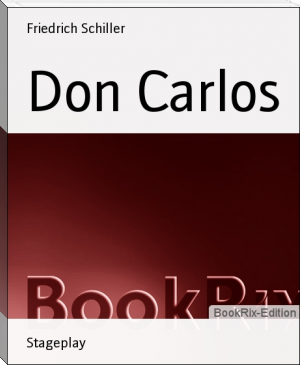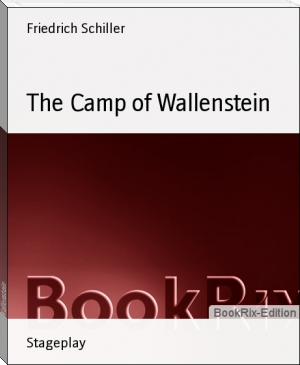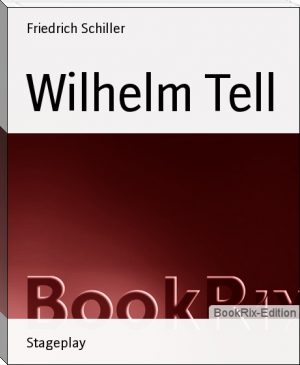Fiesco, Friedrich Schiller [uplifting novels .TXT] 📗

- Author: Friedrich Schiller
Book online «Fiesco, Friedrich Schiller [uplifting novels .TXT] 📗». Author Friedrich Schiller
-
GIANETTINO. Dost thou mark me? Thou canst only fail here! (pointing to his heart).
MOOR. Give yourself no concern.
GIANETTINO. And be sure to strike home - -
MOOR. He shall have enough.
GIANETTINO (maliciously). That the poor count may not have long to suffer.
MOOR. With your leave, sir, a word - at what weight do you estimate his head?
GIANETTINO. What weight? A hundred sequins - -
MOOR (blowing through his fingers). Poh! Light as a feather!
GIANETTINO. What art thou muttering?
MOOR. I was saying - it is light work.
GIANETTINO. That is thy concern. He is the very loadstone of sedition. Mark me, sirrah! let thy blow be sure.
MOOR. But, sir, - I must fly to Venice immediately after the deed.
GIANETTINO. Then take my thanks beforehand. (He throws him a bank-note.) In three days at farthest he must be cold.
[Exit.
MOOR (picking up the note). Well, this really is what I call credit to trust - the simple word of such a rogue as I am!
[Exit.
SCENE III.
CALCAGNO, behind him SACCO, both in black cloaks.
CALCAGNO. I perceive thou watchest all my steps.
SACCO. And I observe thou wouldst conceal them from me. Attend, Calcagno! For some weeks past I have remarked the workings of thy countenance. They bespeak more than concerns the interests of our country. Brother, I should think that we might mutually exchange our confidence without loss on either side. What sayest thou? Wilt thou be sincere?
CALCAGNO. So truly, that thou shalt not need to dive into the recesses of my soul; my heart shall fly half-way to meet thee on my tongue - I love the Countess of Fiesco.
SACCO (starts back with astonishment). That, at least, I should not have discovered had I made all possibilities pass in review before me. My wits are racked to comprehend thy choice, but I must have lost them altogether if thou succeed.
CALCAGNO. They say she is a pattern of the strictest virtue.
SACCO. They lie. She is the whole volume on that insipid text. Calcagno, thou must choose one or the other - either to give up thy heart or thy profession.
CALCAGNO. The Count is faithless to her; and of all the arts that may seduce a woman the subtlest is jealousy. A plot against the Dorias will at the same time occupy the Count, and give me easy access to his house. Thus, while the shepherd guards against the wolf, the fox shall make havoc of the poultry.
SACCO. Incomparable brother, receive my thanks! A blush is now superfluous, and I can tell thee openly what just now I was ashamed even to think. I am a beggar if the government be not soon overturned.
CALCAGNO. What, are thy debts so great?
SACCO. So immense that even one-tenth of them would more than swallow ten times my income. A convulsion of the state will give me breath; and if it do not cancel all my debts, at least 'twill stop the mouths of bawling creditors.
CALCAGNO. I understand thee; and if then, perchance, Genoa should be freed, Sacco will be hailed his country's savior. Let no one trick out to me the threadbare tale of honesty, if the fate of empires hang on the bankruptcy of a prodigal and the lust of a debauchee. By heaven, Sacco, I admire the wise design of Providence, that in us would heal the corruptions in the heart of the state by the vile ulcers on its limbs. Is thy design unfolded to Verrina?
SACCO. As far as it can be unfolded to a patriot. Thou knowest his iron integrity, which ever tends to that one point, his country. His hawk-like eye is now fixed on Fiesco, and he has half-conceived a hope of thee to join the bold conspiracy.
CALCAGNO. Oh, he has an excellent nose! Come, let us seek him, and fan the flame of liberty in his breast by our accordant spirit.
[Exeunt.
SCENE IV.
JULIA, agitated with anger, and FIESCO, in a white mask,
following her.
JULIA. Servants! footmen!
FIESCO. Countess, whither are you going? What do you intend?
JULIA. Nothing - nothing at all. (To the servants, who enter and immediately retire.) Let my carriage draw up - -
FIESCO. Pardon me, it must not. You are offended.
JULIA. Oh, by no means. Away - you tear my dress to pieces. Offended. Who is here that can offend me? Go, pray go.
FIESCO (upon one knee). Not till you tell me what impertinent - -
JULIA (stands still in a haughty attitude). Fine! Fine! Admirable! Oh, that the Countess of Lavagna might be called to view this charming scene! How, Count, is this like a husband? This posture would better suit the chamber of your wife when she turns over the journal of your caresses and finds a void in the account. Rise, sir, and seek those to whom your overtures will prove more acceptable. Rise - unless you think your gallantries will atone for your wife's impertinence.
FIESCO (jumping up). Impertinence! To you?
JULIA. To break up! To push away her chair! To turn her back upon the table - that table, Count, where I was sitting - -
FIESCO. 'Tis inexcusable.
JULIA. And is that all? Out upon the jade! Am I, then, to blame because the Count makes use of his eyes? (Smilingly admiring herself.)
FIESCO. 'Tis the fault of your beauty, madam, that keeps them in such sweet slavery.
JULIA. Away with compliment where honor is concerned. Count, I insist on satisfaction. Where shall I find it, in you, or in my uncle's vengeance?
FIESCO. Find it in the arms of love - of love that would repair the offence of jealousy.
JULIA. Jealousy! Jealousy! Poor thing! What would she wish for? (Admiring herself in the glass.) Could she desire a higher compliment than were I to declare her taste my own? (Haughtily.) Doria and Fiesco! Would not the Countess of Lavagna have reason to feel honored if Doria's niece deigned to envy her choice? (In a friendly tone, offering the Count her hand to kiss.) I merely assume the possibility of such a case, Count.
FIESCO (with animation). Cruel Countess! Thus to torment me. I know, divine Julia, that respect is all I ought to feel for you. My reason bids me bend a subject's knee before the race of Doria; but my heart adores the beauteous Julia. My love is criminal, but 'tis also heroic, and dares o'erleap the boundaries of rank, and soar towards the dazzling sun of majesty.
JULIA. A great and courtly falsehood, paraded upon stilts! While his tongue deifies me, his heart beats beneath the picture of another.
FIESCO. Rather say it beats indignantly against it, and would shake off the odious burden. (Taking the picture of LEONORA, which is suspended by a sky-blue ribbon from his breast, and delivering it to JULIA.) Place your own image on that altar and you will instantly annihilate this idol.
JULIA (pleased, puts by the picture hastily). A great sacrifice, by mine honor, and which deserves my thanks. (Hangs her own picture about his neck.) So, my slave, henceforth bear your badge of service.
[Exit.
FIESCO (with transport). Julia loves me! Julia! I envy not even the gods. (Exulting.) Let this night be a jubilee. Joy shall attain its summit. Ho! within there! (Servants come running in.) Let the floors swim with Cyprian nectar, soft strains of music rouse midnight from her leaden slumber, and a thousand burning lamps eclipse the morning sun. Pleasure shall reign supreme, and the Bacchanal dance so wildly beat the ground that the dark kingdom of the shades below shall tremble at the uproar!
[Exit hastily. A noisy allegro, during which the back scene opens,
and discovers a grand illuminated saloon, many masks - dancing. At
the side, drinking and playing tables, surrounded with company.
SCENE V.
GIANETTINO, almost intoxicated, LOMELLINO, ZIBO, ZENTURIONE,
VERRINA, CALCAGNO, all masked. Several other nobles and ladies.
GIANETTINO (boisterously). Bravo! Bravo! These wines glide down charmingly. The dancers perform a merveille. Go, one of you, and publish it throughout Genoa that I am in good humor, and that every one may enjoy himself. By my ruling star this shall be marked as a red-letter day in the calendar, and underneath be written, - "This day was Prince Doria merry." (The guests lift their glasses to their mouths. A general toast of "The Republic." Sound of trumpets.) The Republic? (Throwing his glass violently on the ground.) There lie its fragments. (Three black masks suddenly rise and collect about GIANETTINO.)
LOMELLINO (supporting GIANETTINO on his arm). My lord, you lately spoke of a young girl whom you saw in the church of St. Lorenzo.
GIANETTINO. I did, my lad! and I must make her acquaintance.
LOMELLINO. That I can manage for your grace.
GIANETTINO (with vehemence). Can you? Can you? Lomellino, you were a candidate for the procuratorship. You shall have it.
LOMELLINO. Gracious prince, it is the second dignity in the state; more than threescore noblemen seek it, and all of them more wealthy and honorable than your grace's humble servant.
GIANETTINO (indignantly). By the name of Doria! You shall be procurator. (The three masks come forward). What talk you of nobility in Genoa? Let them all throw their ancestry and honors into the scale, one hair from the white beard of my old uncle will make it kick the beam. It is my will that you be procurator, and that is tantamount to the votes of the whole senate.
LOMELLINO (in a low voice). The damsel is the only daughter of one Verrina.
GIANETTINO. The girl is pretty, and, in spite of all the devils in hell, I must possess her.
LOMELLINO. What, my lord! the only child of the most obstinate of our republicans?
GIANETTINO. To hell with your republicans! Shall my passion be thwarted by the anger of a vassal? 'Tis as vain as to expect the tower should fall when the boys pelt it with mussel-shells. (The three black masks step nearer, with great emotion.) What! Has the Duke Andreas gained his scars in battle for their wives and children, only that his nephew should court the favor of these vagabond republicans! By the name of Doria they shall swallow this fancy of mine, or I will plant a gallows over the bones of my uncle, on which their Genoese liberty shall kick itself to death. (The three masks step back in disgust.)
LOMELLINO. The damsel is at this moment alone. Her father is here, and one of those three masks.
GIANETTINO. Excellent! Bring me instantly to her.
LOMELLINO. But you
GIANETTINO. Dost thou mark me? Thou canst only fail here! (pointing to his heart).
MOOR. Give yourself no concern.
GIANETTINO. And be sure to strike home - -
MOOR. He shall have enough.
GIANETTINO (maliciously). That the poor count may not have long to suffer.
MOOR. With your leave, sir, a word - at what weight do you estimate his head?
GIANETTINO. What weight? A hundred sequins - -
MOOR (blowing through his fingers). Poh! Light as a feather!
GIANETTINO. What art thou muttering?
MOOR. I was saying - it is light work.
GIANETTINO. That is thy concern. He is the very loadstone of sedition. Mark me, sirrah! let thy blow be sure.
MOOR. But, sir, - I must fly to Venice immediately after the deed.
GIANETTINO. Then take my thanks beforehand. (He throws him a bank-note.) In three days at farthest he must be cold.
[Exit.
MOOR (picking up the note). Well, this really is what I call credit to trust - the simple word of such a rogue as I am!
[Exit.
SCENE III.
CALCAGNO, behind him SACCO, both in black cloaks.
CALCAGNO. I perceive thou watchest all my steps.
SACCO. And I observe thou wouldst conceal them from me. Attend, Calcagno! For some weeks past I have remarked the workings of thy countenance. They bespeak more than concerns the interests of our country. Brother, I should think that we might mutually exchange our confidence without loss on either side. What sayest thou? Wilt thou be sincere?
CALCAGNO. So truly, that thou shalt not need to dive into the recesses of my soul; my heart shall fly half-way to meet thee on my tongue - I love the Countess of Fiesco.
SACCO (starts back with astonishment). That, at least, I should not have discovered had I made all possibilities pass in review before me. My wits are racked to comprehend thy choice, but I must have lost them altogether if thou succeed.
CALCAGNO. They say she is a pattern of the strictest virtue.
SACCO. They lie. She is the whole volume on that insipid text. Calcagno, thou must choose one or the other - either to give up thy heart or thy profession.
CALCAGNO. The Count is faithless to her; and of all the arts that may seduce a woman the subtlest is jealousy. A plot against the Dorias will at the same time occupy the Count, and give me easy access to his house. Thus, while the shepherd guards against the wolf, the fox shall make havoc of the poultry.
SACCO. Incomparable brother, receive my thanks! A blush is now superfluous, and I can tell thee openly what just now I was ashamed even to think. I am a beggar if the government be not soon overturned.
CALCAGNO. What, are thy debts so great?
SACCO. So immense that even one-tenth of them would more than swallow ten times my income. A convulsion of the state will give me breath; and if it do not cancel all my debts, at least 'twill stop the mouths of bawling creditors.
CALCAGNO. I understand thee; and if then, perchance, Genoa should be freed, Sacco will be hailed his country's savior. Let no one trick out to me the threadbare tale of honesty, if the fate of empires hang on the bankruptcy of a prodigal and the lust of a debauchee. By heaven, Sacco, I admire the wise design of Providence, that in us would heal the corruptions in the heart of the state by the vile ulcers on its limbs. Is thy design unfolded to Verrina?
SACCO. As far as it can be unfolded to a patriot. Thou knowest his iron integrity, which ever tends to that one point, his country. His hawk-like eye is now fixed on Fiesco, and he has half-conceived a hope of thee to join the bold conspiracy.
CALCAGNO. Oh, he has an excellent nose! Come, let us seek him, and fan the flame of liberty in his breast by our accordant spirit.
[Exeunt.
SCENE IV.
JULIA, agitated with anger, and FIESCO, in a white mask,
following her.
JULIA. Servants! footmen!
FIESCO. Countess, whither are you going? What do you intend?
JULIA. Nothing - nothing at all. (To the servants, who enter and immediately retire.) Let my carriage draw up - -
FIESCO. Pardon me, it must not. You are offended.
JULIA. Oh, by no means. Away - you tear my dress to pieces. Offended. Who is here that can offend me? Go, pray go.
FIESCO (upon one knee). Not till you tell me what impertinent - -
JULIA (stands still in a haughty attitude). Fine! Fine! Admirable! Oh, that the Countess of Lavagna might be called to view this charming scene! How, Count, is this like a husband? This posture would better suit the chamber of your wife when she turns over the journal of your caresses and finds a void in the account. Rise, sir, and seek those to whom your overtures will prove more acceptable. Rise - unless you think your gallantries will atone for your wife's impertinence.
FIESCO (jumping up). Impertinence! To you?
JULIA. To break up! To push away her chair! To turn her back upon the table - that table, Count, where I was sitting - -
FIESCO. 'Tis inexcusable.
JULIA. And is that all? Out upon the jade! Am I, then, to blame because the Count makes use of his eyes? (Smilingly admiring herself.)
FIESCO. 'Tis the fault of your beauty, madam, that keeps them in such sweet slavery.
JULIA. Away with compliment where honor is concerned. Count, I insist on satisfaction. Where shall I find it, in you, or in my uncle's vengeance?
FIESCO. Find it in the arms of love - of love that would repair the offence of jealousy.
JULIA. Jealousy! Jealousy! Poor thing! What would she wish for? (Admiring herself in the glass.) Could she desire a higher compliment than were I to declare her taste my own? (Haughtily.) Doria and Fiesco! Would not the Countess of Lavagna have reason to feel honored if Doria's niece deigned to envy her choice? (In a friendly tone, offering the Count her hand to kiss.) I merely assume the possibility of such a case, Count.
FIESCO (with animation). Cruel Countess! Thus to torment me. I know, divine Julia, that respect is all I ought to feel for you. My reason bids me bend a subject's knee before the race of Doria; but my heart adores the beauteous Julia. My love is criminal, but 'tis also heroic, and dares o'erleap the boundaries of rank, and soar towards the dazzling sun of majesty.
JULIA. A great and courtly falsehood, paraded upon stilts! While his tongue deifies me, his heart beats beneath the picture of another.
FIESCO. Rather say it beats indignantly against it, and would shake off the odious burden. (Taking the picture of LEONORA, which is suspended by a sky-blue ribbon from his breast, and delivering it to JULIA.) Place your own image on that altar and you will instantly annihilate this idol.
JULIA (pleased, puts by the picture hastily). A great sacrifice, by mine honor, and which deserves my thanks. (Hangs her own picture about his neck.) So, my slave, henceforth bear your badge of service.
[Exit.
FIESCO (with transport). Julia loves me! Julia! I envy not even the gods. (Exulting.) Let this night be a jubilee. Joy shall attain its summit. Ho! within there! (Servants come running in.) Let the floors swim with Cyprian nectar, soft strains of music rouse midnight from her leaden slumber, and a thousand burning lamps eclipse the morning sun. Pleasure shall reign supreme, and the Bacchanal dance so wildly beat the ground that the dark kingdom of the shades below shall tremble at the uproar!
[Exit hastily. A noisy allegro, during which the back scene opens,
and discovers a grand illuminated saloon, many masks - dancing. At
the side, drinking and playing tables, surrounded with company.
SCENE V.
GIANETTINO, almost intoxicated, LOMELLINO, ZIBO, ZENTURIONE,
VERRINA, CALCAGNO, all masked. Several other nobles and ladies.
GIANETTINO (boisterously). Bravo! Bravo! These wines glide down charmingly. The dancers perform a merveille. Go, one of you, and publish it throughout Genoa that I am in good humor, and that every one may enjoy himself. By my ruling star this shall be marked as a red-letter day in the calendar, and underneath be written, - "This day was Prince Doria merry." (The guests lift their glasses to their mouths. A general toast of "The Republic." Sound of trumpets.) The Republic? (Throwing his glass violently on the ground.) There lie its fragments. (Three black masks suddenly rise and collect about GIANETTINO.)
LOMELLINO (supporting GIANETTINO on his arm). My lord, you lately spoke of a young girl whom you saw in the church of St. Lorenzo.
GIANETTINO. I did, my lad! and I must make her acquaintance.
LOMELLINO. That I can manage for your grace.
GIANETTINO (with vehemence). Can you? Can you? Lomellino, you were a candidate for the procuratorship. You shall have it.
LOMELLINO. Gracious prince, it is the second dignity in the state; more than threescore noblemen seek it, and all of them more wealthy and honorable than your grace's humble servant.
GIANETTINO (indignantly). By the name of Doria! You shall be procurator. (The three masks come forward). What talk you of nobility in Genoa? Let them all throw their ancestry and honors into the scale, one hair from the white beard of my old uncle will make it kick the beam. It is my will that you be procurator, and that is tantamount to the votes of the whole senate.
LOMELLINO (in a low voice). The damsel is the only daughter of one Verrina.
GIANETTINO. The girl is pretty, and, in spite of all the devils in hell, I must possess her.
LOMELLINO. What, my lord! the only child of the most obstinate of our republicans?
GIANETTINO. To hell with your republicans! Shall my passion be thwarted by the anger of a vassal? 'Tis as vain as to expect the tower should fall when the boys pelt it with mussel-shells. (The three black masks step nearer, with great emotion.) What! Has the Duke Andreas gained his scars in battle for their wives and children, only that his nephew should court the favor of these vagabond republicans! By the name of Doria they shall swallow this fancy of mine, or I will plant a gallows over the bones of my uncle, on which their Genoese liberty shall kick itself to death. (The three masks step back in disgust.)
LOMELLINO. The damsel is at this moment alone. Her father is here, and one of those three masks.
GIANETTINO. Excellent! Bring me instantly to her.
LOMELLINO. But you
Free e-book «Fiesco, Friedrich Schiller [uplifting novels .TXT] 📗» - read online now
Similar e-books:





Comments (0)